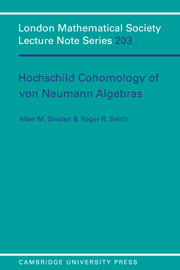3 - Averaging in Continuous and Normal Cohomology
Published online by Cambridge University Press: 29 September 2009
Summary
Introduction
This chapter contains the basic averaging techniques and the method for lifting a continuous multilinear map to the weak closure of the algebra. The averaging first leads to the cocycles being replaced by cocycles that are module maps over hyperfinite (= injective) subalgebras, and then to completely bounded maps in suitable situations (see Section 6.2). The weak lifting results are used to prove that continuous and normal cohomology are equal for dual normal modules over von Neumann algebras. Both the above methods will be used on continuous and completely bounded multilinear maps, with the proofs for the latter being just a minor modification of the continuous case developed by Johnson, Kadison and Ringrose.
This introduction will contain a discussion of the averaging techniques and the normal operator lifting method, and the rest of the chapter will be devoted to the details. The averaging techniques over C*-algebras are in Section 3.2 and the normal operator lifting methods are in Section 3.3, as these require the averaging technique at one critical point. The two sections come together in Section 3.4 in averaging over a hyperfinite von Neumann subalgebra.
The averaging technique used is basically just to integrate over the compact unitary group of a finite dimensional C*-algebra. Taking suitable weak limits as the finite dimensional algebras increase in size leads to averages that are essentially over infinite dimensional algebras. A similar route is to use an amenable group of unitary operators and the (right) invariant mean to average.
- Type
- Chapter
- Information
- Hochschild Cohomology of Von Neumann Algebras , pp. 77 - 102Publisher: Cambridge University PressPrint publication year: 1995

